Did you know that the pre-colonial Philippine justice system was one of the earliest forms of organized legal traditions in Southeast Asia? Long before Spanish colonization, indigenous communities had their own ways of maintaining order and fairness. These systems were deeply rooted in the values of the barangay, the smallest political unit in early Philippine society.
Understanding these historical practices gives us insight into how justice was perceived and administered. Unlike modern systems, pre-colonial laws were often oral and tied to community customs. Punishments were designed to restore harmony rather than merely penalize the offender.
This article explores the unique aspects of the pre-colonial Philippine justice system. From its comparison with classical legal traditions to its role in shaping social justice, we’ll uncover how these early practices influenced the nation’s legal heritage.
Key Takeaways
- The pre-colonial justice system was rooted in community customs and oral traditions.
- Barangays played a central role in maintaining order and fairness.
- Punishments aimed to restore harmony rather than focus on retribution.
- Early legal practices influenced the Philippines’ broader legal heritage.
- Understanding these systems provides valuable historical context.
Introduction to Pre-Colonial Philippine Justice System
The pre-colonial Philippine legal system was a unique blend of tradition and community-driven practices. Rooted in the values of the barangay, it focused on maintaining harmony rather than enforcing strict rules. This system was deeply tied to the cultural and social fabric of indigenous communities.
Unlike modern legal frameworks, pre-colonial laws were often oral and passed down through generations. They emphasized fairness and the restoration of balance within the community. For example, disputes were resolved through mediation rather than punishment.
The idea of fairness in pre-colonial society differed significantly from later colonial systems. While the colonial state focused on centralized authority, indigenous practices were more decentralized and community-oriented. This approach allowed for greater flexibility and adaptability.
Historical records show that early legal traditions were influenced by both local customs and external ideas. This interplay created a system that was uniquely Filipino. Understanding these practices provides valuable insight into the evolution of the nation’s legal heritage.
Historical Background of Justice in Pre-Colonial Philippines
Long before formal legal systems, the Philippines had a rich tradition of community-based dispute resolution. These practices were deeply rooted in oral traditions and customary laws, shaping the early legal landscape of the archipelago.
Early Influences and Practices
Indigenous communities relied on oral traditions to pass down laws and norms. Customary laws, often unwritten, were central to maintaining order. These practices emphasized fairness and harmony, with disputes resolved through mediation rather than punishment.
One key concept was distributive justice, which focused on equitable resource sharing within the community. This principle ensured that resources like land and food were fairly distributed, fostering social cohesion.
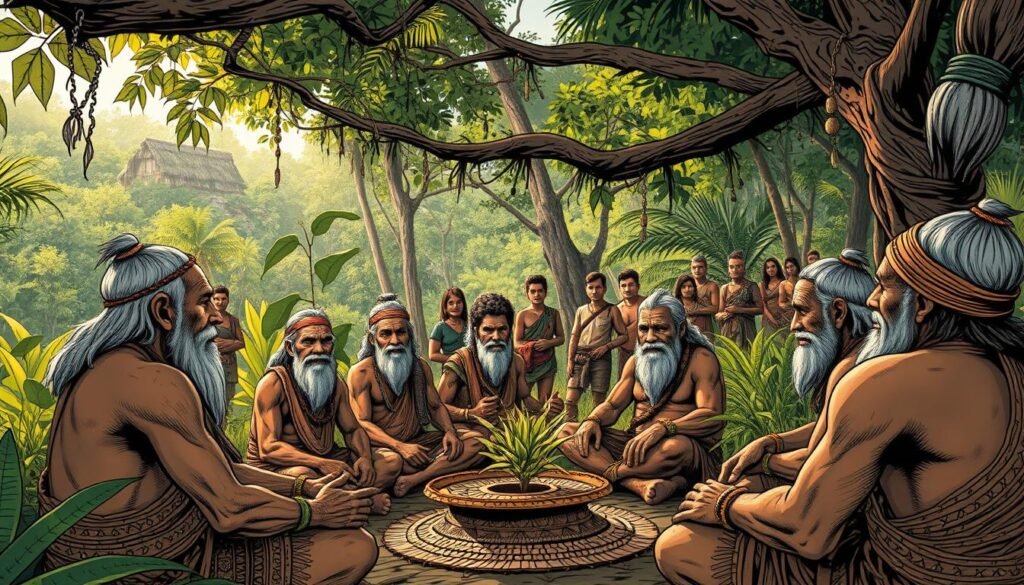
Historical records highlight specific cases where traditional laws were applied. For example, disputes over land or resources were often settled by village elders, ensuring decisions aligned with community values.
Transition to Organized Legal Norms
Over time, interactions among communities led to the evolution of legal practices. Informal methods gave way to more structured systems, particularly in larger barangays. This shift marked the beginning of organized legal norms in indigenous society.
As communities grew, so did the need for systematic frameworks. Leaders began codifying laws, blending local customs with external influences. This transition laid the groundwork for the Philippines’ legal heritage.
“The evolution from informal dispute resolution to organized norms reflects the adaptability of pre-colonial societies.”
| Period | Legal Practices | Key Features |
|---|---|---|
| Early Pre-Colonial | Oral traditions, customary laws | Community mediation, fairness |
| Late Pre-Colonial | Codified laws, structured systems | Resource sharing, organized norms |
This historical background reveals how early practices shaped the world of pre-colonial legal systems. From informal customs to organized norms, these traditions laid the foundation for modern legal frameworks in the Philippines.
Justice: Core Principle in Pre-Colonial Society
In pre-colonial Philippine society, fairness and balance were the cornerstones of community life. The concept of fairness was deeply embedded in the daily lives of indigenous Filipinos, shaping their social and legal systems. Unlike modern frameworks, these systems focused on restoring harmony rather than enforcing strict rules.
Legal principles played a crucial role in maintaining social order. Disputes were resolved through mediation, ensuring decisions aligned with community values. This approach emphasized fairness and the restoration of balance, fostering trust and cohesion within the barangay.
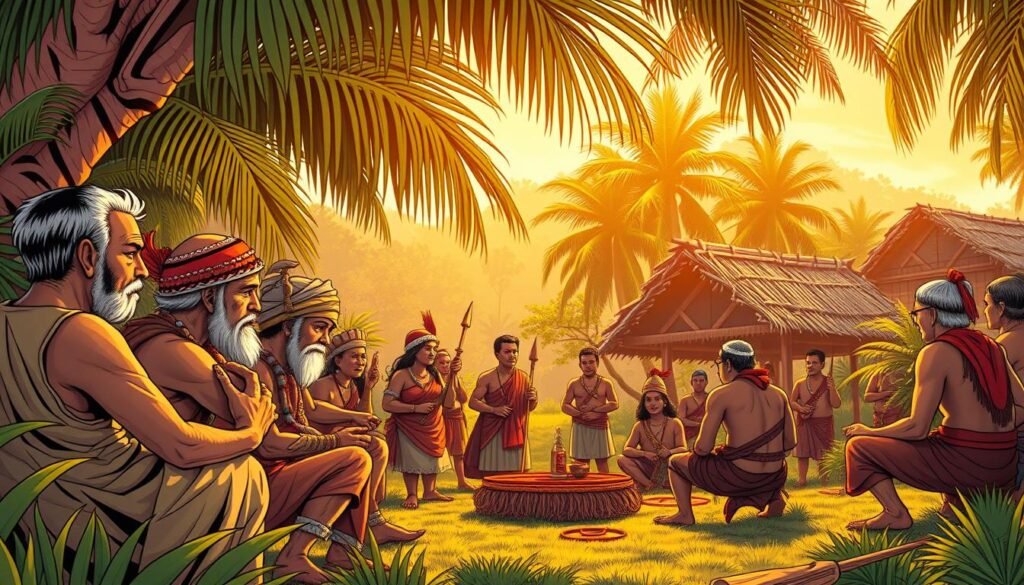
The indigenous legal system balanced rights and duties effectively. Every member of the community had responsibilities, and leaders ensured these were upheld. This balance prevented conflicts and promoted a sense of shared purpose.
Everyday practices reflected the contrast between fairness and unfairness. Acts of injustice were rare, as the community prioritized harmony. When disputes arose, they were resolved swiftly and equitably, reinforcing societal stability.
These traditional values had a lasting impact on societal cohesion. By prioritizing fairness, pre-colonial communities built strong, resilient social structures. These principles continue to influence the Philippines’ legal heritage today.
| Aspect | Pre-Colonial Practice | Impact |
|---|---|---|
| Conflict Resolution | Mediation by elders | Restored harmony |
| Rights and Duties | Balanced responsibilities | Prevented disputes |
| Community Governance | Decentralized leadership | Fostered trust |
Key Terms and Glossary of Justice Concepts
Understanding the language of fairness in pre-colonial Philippines requires exploring key terms and their cultural significance. These terms were not just words but reflected the values and principles that guided daily life and legal practices.
Defining Core Terms
Several terms were central to the concept of fairness in pre-colonial society. For example, “karapatan” (right) referred to the entitlements of individuals within the community. Another term, “katarungan,” encapsulated the idea of balance and equity in resolving disputes.
These terms were deeply rooted in oral traditions and customary laws. They emphasized the importance of harmony and the restoration of balance rather than punitive measures.

Contextual Usage in Pre-Colonial Culture
In pre-colonial culture, terms like “karapatan” were used to describe the right to resources such as land and food. Leaders ensured these rights were upheld, fostering trust and cohesion within the community.
Disputes were often resolved through mediation, where the concept of “katarungan” played a crucial role. Decisions were made to restore harmony, ensuring that all parties felt heard and respected.
- Karapatan: Entitlements of individuals within the community.
- Katarungan: Balance and equity in resolving disputes.
- Bayanihan: Collective effort and shared responsibilities.
These terms were not just legal jargon but were part of everyday interactions. They shaped how community members interpreted their roles and responsibilities, ensuring a balanced and fair society.
Establishment of Laws and Norms in Indigenous Communities
Indigenous communities in the Philippines developed laws and norms organically, rooted in their cultural and social needs. These laws were not written but passed down through oral traditions, ensuring every member understood their role in maintaining harmony.
Customary laws were created to address specific community needs. For example, disputes over resources were resolved through mediation led by elders. This process ensured fairness and proper treatment for all members.

The development of legal norms was deeply tied to cultural and ritual practices. Festivals, ceremonies, and communal activities often reinforced these norms. This organic growth ensured that laws were adaptable and relevant to the community’s evolving needs.
Collective needs played a significant role in shaping these laws. Decisions were made with the entire community in mind, ensuring that no member was left behind. This approach fostered trust and cooperation.
- Customary laws were passed down orally, ensuring accessibility.
- Elders mediated disputes, emphasizing fairness and balance.
- Cultural rituals reinforced legal norms, making them relatable.
- Collective needs guided decision-making, promoting inclusivity.
- Individual members played active roles in legal processes.
Individual members also had a say in legal decision-making. Their voices were heard during community gatherings, ensuring that laws reflected the word of the people. This participatory approach strengthened the community’s legal framework.
For more insights into how these practices influenced broader societal structures, explore this detailed analysis.
Punishments and Their Philosophical Underpinnings
The pre-colonial Philippines employed a unique approach to penalties, focusing on restoration rather than retribution. This system was deeply rooted in community values, ensuring that punishments served to restore balance rather than inflict harm. Understanding these practices provides insight into how early societies maintained order and fairness.
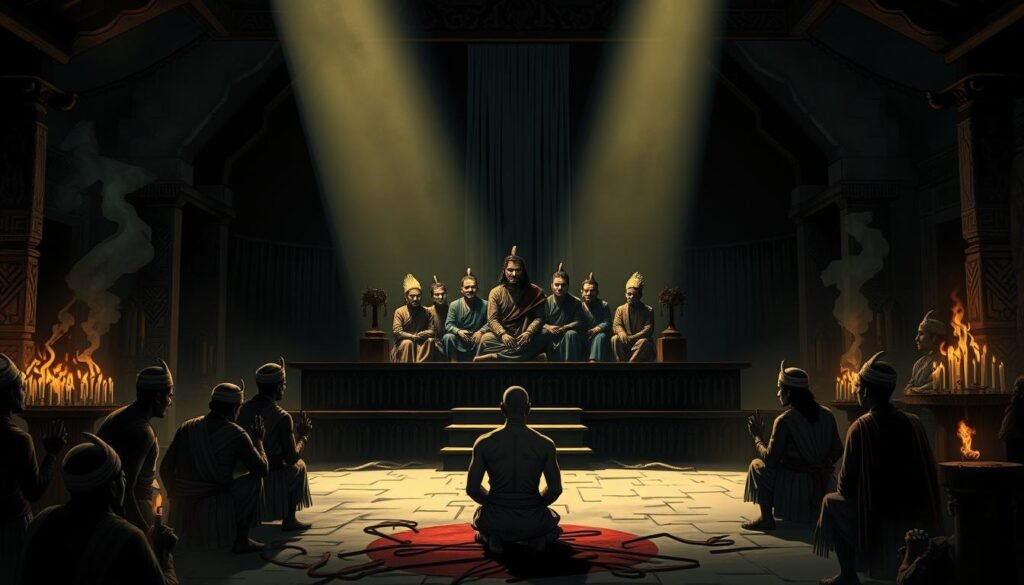
Types of Punishments
Pre-colonial punishments varied depending on the severity of the offense. Common penalties included fines, community service, and temporary exile. These actions were designed to correct behavior rather than punish harshly. For example, offenders might be required to contribute to community projects as a way to make amends.
In cases of serious wrongdoing, the community often sought to restore harmony through mediation. Elders played a key role in resolving disputes, ensuring that all parties felt heard. This approach provided an opportunity for offenders to learn from their mistakes and reintegrate into society.
The Rationale Behind Penalties
The philosophical underpinnings of pre-colonial punishments were rooted in restorative and corrective theories. The goal was not to inflict suffering but to restore balance and educate the offender. This system emphasized fairness and proportionality, ensuring that penalties matched the nature of the offense.
Unlike modern retributive theories, pre-colonial practices focused on moral growth. Offenders were given an opportunity to reflect on their actions and make amends. This approach fostered a sense of responsibility and encouraged positive behavior.
“The purpose of punishment was not to harm but to heal and restore harmony within the community.”
| Type of Punishment | Purpose | Outcome |
|---|---|---|
| Fines | Compensate the victim | Restore balance |
| Community Service | Contribute to society | Encourage responsibility |
| Mediation | Resolve disputes | Foster harmony |
This system ensured that penalties were not only corrective but also educational. By focusing on restoration, pre-colonial societies created a framework that prioritized fairness and community well-being. These principles continue to influence modern approaches to justice.
Social Justice and Fairness in Traditional Practices
Traditional practices in pre-colonial Philippines were built on mutual agreement and shared values. These practices ensured fairness among all members of the community, fostering trust and cohesion. By prioritizing harmony, pre-colonial societies created a system where everyone had a voice.
One key aspect was the process of information sharing. Elders and leaders played a crucial role in disseminating knowledge about community norms and laws. This ensured that every member had a clear understanding of their rights and responsibilities.

Disputes were resolved through collective decision-making. Village elders mediated conflicts, ensuring that all parties felt heard. This approach emphasized fairness and the restoration of balance, rather than punitive measures.
Specific events in community life were governed by principles of social justice. For example, resource allocation was based on need, ensuring equitable distribution. This practice reinforced the idea that individual rights were balanced with collective well-being.
“Fairness was not just a principle but a way of life in pre-colonial communities, ensuring harmony and stability.”
These traditional mechanisms were highly adaptive. Over time, they evolved to meet the changing needs of the community. This flexibility allowed pre-colonial societies to maintain fairness even during challenging events.
- Mutual agreement ensured fairness among all members.
- Information sharing fostered a clear understanding of community norms.
- Collective decision-making resolved disputes equitably.
- Resource allocation prioritized social justice and balance.
- Adaptive mechanisms maintained fairness over time.
By embedding fairness into everyday practices, pre-colonial communities created a system that prioritized social justice. These traditions continue to influence modern approaches to fairness and equity.
Distributive Justice in Community Resource Sharing
Distributive justice was a cornerstone of resource allocation in pre-colonial Philippine communities, ensuring fairness and balance. This principle guided how resources like land, food, and water were shared among members. It aimed to create a harmonious society where no one was left behind.
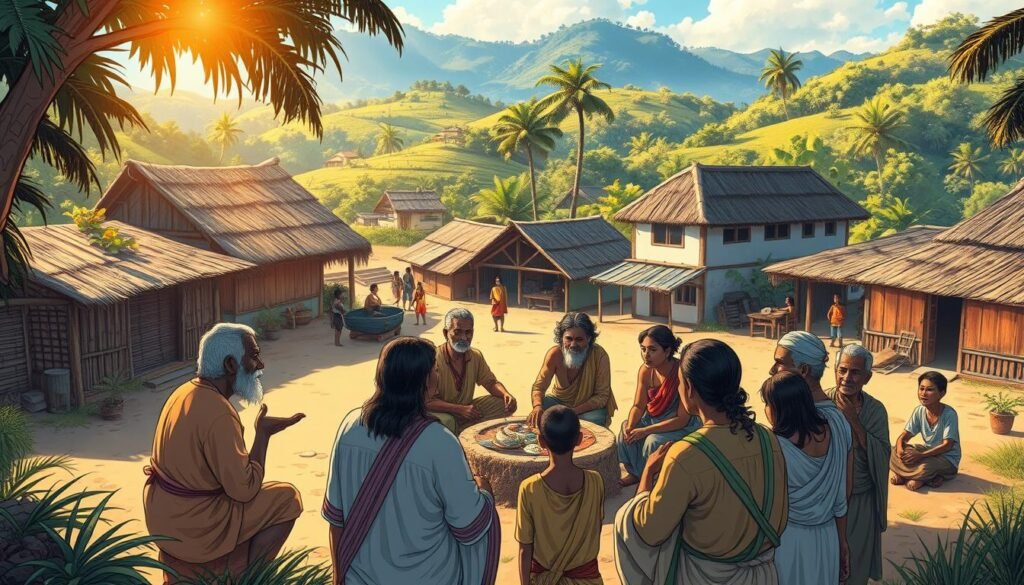
Principles of Equal Distribution
In pre-colonial societies, resources were allocated based on need rather than status. This approach ensured that everyone had access to essential goods. Elders and leaders played a key role in overseeing this process, making sure decisions were fair and transparent.
Scholarly sources from university press highlight that distributive justice was rooted in communal values. It emphasized equitable sharing to prevent conflicts and foster trust. For example, during harvest seasons, crops were distributed according to family size and need.
“Distributive justice in pre-colonial Philippines was not just about fairness but about maintaining social cohesion and stability.”
This principle also extended to land ownership. Families were granted land based on their ability to cultivate it, ensuring productive use. This system prevented hoarding and promoted collective well-being.
- Resources were shared based on need, not status.
- Elders ensured transparency in decision-making.
- Land ownership was tied to cultivation ability.
- Harvests were distributed equitably among families.
The impact of these practices was profound. Communities thrived because everyone felt valued and supported. This approach to resource sharing laid the foundation for modern ideas of fairness and equity in the Philippines.
The Role of Personhood in Legal Traditions
The concept of personhood played a pivotal role in shaping the legal traditions of pre-colonial Philippines. It was deeply tied to individual rights and responsibilities, ensuring that every member of the community had a voice. This approach created a system where fairness was not just a principle but a lived experience.
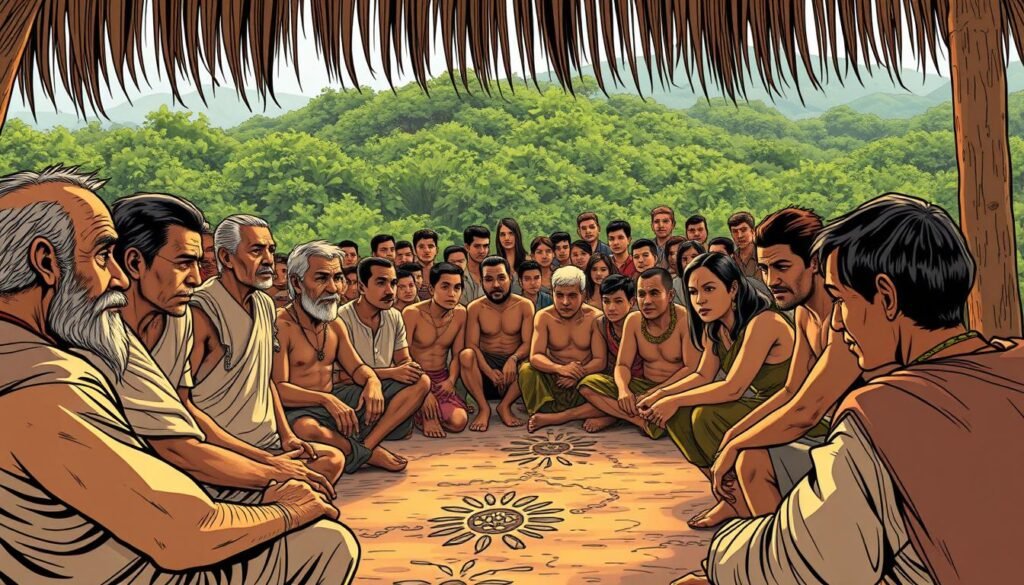
Individual Rights and Responsibilities
In pre-colonial society, personhood was closely linked to one’s role within the community. Individuals had specific rights, such as access to resources, but also responsibilities to uphold communal harmony. This balance ensured that everyone contributed to the collective well-being.
For example, disputes were often resolved through mediation, where individuals could present their way of seeing the issue. Elders ensured that decisions respected both personal rights and communal expectations. This process highlighted the importance of individual agency within a collective framework.
Scholars from university studies have noted that this system allowed individuals to pursue fairness without disrupting social cohesion. It was a unique blend of personal initiative and communal values, creating a distinct legal identity for pre-colonial societies.
Claiming Rights and Pursuing Fairness
Individuals in pre-colonial Philippines had the ability to claim their rights through established legal processes. For instance, if someone felt wronged, they could bring their case to community leaders. These leaders would see that the matter was addressed fairly, ensuring that no one was left unheard.
This system emphasized the importance of personhood in legal traditions. It recognized that every individual had intrinsic value and deserved to be treated with respect. By integrating personal rights into communal practices, pre-colonial societies created a framework that prioritized both individual and collective well-being.
For a deeper understanding of how these traditions evolved, explore this detailed analysis on legal personhood.
The Concept of Injustice: A Glossary Perspective
The idea of unfairness in pre-colonial Philippines was deeply tied to community harmony and balance. In indigenous societies, injustice was not just a personal issue but a disruption to the collective well-being. Understanding how these communities defined and addressed unfair treatment provides valuable insight into their legal traditions.
Definitions and Contexts
In pre-colonial times, injustice was often understood as any action that disrupted social order or violated communal norms. This included acts of inequality, such as unfair resource distribution or biased treatment. Customary laws were designed to address these issues, ensuring that fairness was restored through mediation and collective decision-making.
For example, disputes over land or resources were resolved by village elders, who ensured that all parties were treated equitably. This approach emphasized the importance of balance and mutual respect, rather than punitive measures. The form of justice in these societies was restorative, focusing on healing relationships rather than punishing offenders.
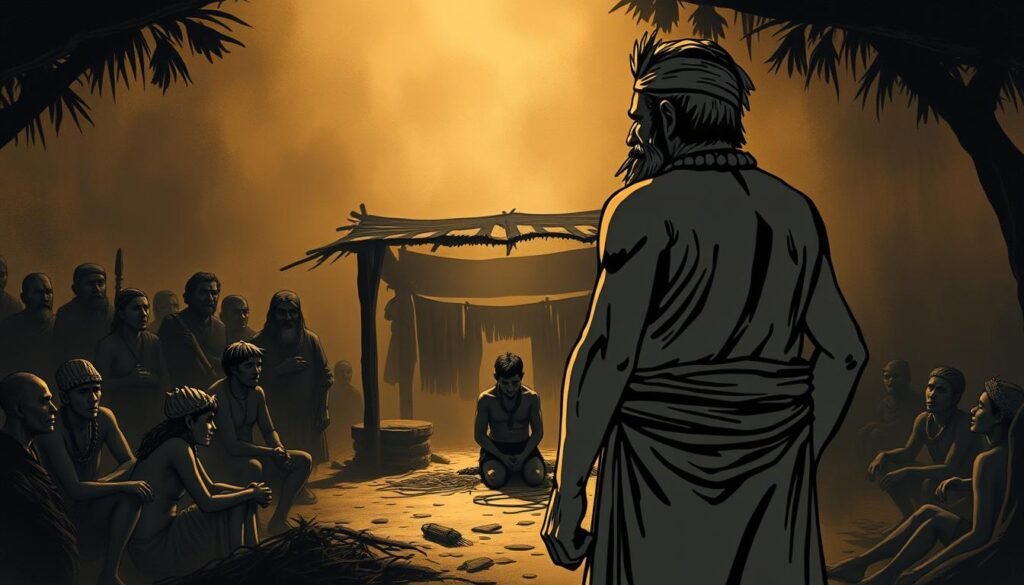
However, rectifying injustice was not without challenges. Limited resources often made it difficult to address every case of unfairness. Additionally, differing value systems within and between communities sometimes led to conflicting interpretations of what constituted injustice. Despite these challenges, pre-colonial societies prioritized harmony and worked to resolve disputes in ways that upheld their shared values.
Modern academic discourse offers a broader perspective on these traditional practices. Scholars have noted that pre-colonial approaches to injustice were rooted in communal values, contrasting with later colonial systems that emphasized individual punishment. This comparison highlights the adaptability and resilience of indigenous legal traditions.
“Injustice in pre-colonial societies was not just about individual wrongs but about restoring balance and harmony within the community.”
For a deeper understanding of how these principles evolved, explore this detailed analysis on social justice.
Comparative Insights: Pre-Colonial versus Colonial Justice Systems
The shift from pre-colonial to colonial legal systems in the Philippines marked a profound transformation in how fairness was administered. Pre-colonial practices were deeply rooted in community values, emphasizing harmony and restoration. In contrast, colonial systems introduced centralized authority and punitive measures, altering the traditional distribution of fairness.
Pre-colonial systems were decentralized, with disputes resolved through mediation by elders. This approach ensured that decisions aligned with communal values. Colonial rule, however, imposed a hierarchical structure, often prioritizing the interests of the ruling power over local customs. This shift disrupted the social fabric of indigenous communities.
One key difference lies in the principles guiding each system. Pre-colonial practices focused on restorative fairness, aiming to heal relationships and restore balance. Colonial systems, influenced by European legal traditions, emphasized retribution and deterrence. This change reflected a broader shift in how fairness was perceived and enforced.
Scholarly insights from Cambridge studies highlight the cultural and institutional differences between the two systems. Pre-colonial practices were adaptive and community-driven, while colonial systems were rigid and externally imposed. This contrast underscores the challenges faced by indigenous communities during the transition.
“Colonial rule not only altered legal frameworks but also redefined the very concept of fairness, often at the expense of indigenous traditions.”
The benefit of pre-colonial systems was their ability to maintain social cohesion through collective decision-making. However, colonial systems introduced formal institutions that, while structured, often marginalized local voices. This imbalance created tensions that persist in modern legal frameworks.
For a deeper understanding of these shifts, explore this detailed analysis on the evolution of legal.
- Pre-colonial systems emphasized restoration and harmony.
- Colonial systems introduced centralized authority and retribution.
- Cultural and institutional differences shaped the transition.
- The benefit of pre-colonial practices was their adaptability.
- Colonial rule often marginalized indigenous traditions.
Understanding these comparative insights provides valuable context for the evolution of fairness in the Philippines. It highlights the resilience of indigenous practices and the lasting impact of colonial rule on the nation’s legal heritage.
Legal Institutions and Enforcement Mechanisms
Legal institutions in pre-colonial Philippines were deeply rooted in community-driven practices, ensuring order and fairness. These systems relied on the collective efforts of tribal councils and respected leaders to maintain harmony and resolve disputes. Unlike modern centralized systems, pre-colonial legal frameworks were decentralized, focusing on restoring balance rather than imposing punitive measures.
Role of Tribal Councils
Tribal councils played a central role in regulating fairness within pre-colonial communities. Composed of elders and respected members, these councils were responsible for interpreting customary laws and mediating disputes. Their decisions were guided by the principle of desert, ensuring that outcomes aligned with the individual’s behavior and the community’s values.
For example, disputes over land or resources were often resolved through mediation. The council’s goal was to restore harmony rather than punish the offender. This approach emphasized the importance of collective well-being over individual retribution.
Community Leaders and Their Authority
Community leaders, such as the datu, held significant authority in enforcing laws and maintaining order. Their role was not just to administer fairness but also to ensure that the community’s needs were met. Leaders worked closely with tribal councils to address disputes and implement decisions that upheld communal harmony.
One key aspect of their authority was the ability to assess the work of individuals within the community. For instance, those who contributed positively to society were often rewarded, while those who disrupted harmony faced corrective measures. This system ensured that legal outcomes were proportional to the individual’s actions.
“The authority of community leaders was not just about enforcing rules but about fostering trust and cohesion within the barangay.”
Enforcement mechanisms in pre-colonial societies were highly effective due to their adaptability. Leaders and councils integrated informal practices, such as mediation, with more structured approaches to address complex disputes. This blend of formal and informal methods ensured that fairness was administered in a way that resonated with the community’s values.
| Institution | Role | Outcome |
|---|---|---|
| Tribal Councils | Mediate disputes, interpret laws | Restore harmony |
| Community Leaders | Enforce laws, maintain order | Ensure proportional outcomes |
For a deeper understanding of how these traditional practices influenced modern legal systems, explore this detailed analysis on legal institutions.
Rituals and Ceremonies in Administering Justice
Rituals and ceremonies played a pivotal role in the administration of fairness in pre-colonial Philippine communities. These practices were not just symbolic but served as powerful tools to reinforce social norms and values. Through these ceremonies, communities ensured that fairness was upheld in a way that resonated with their cultural identity.
Ceremonial Punishments
Ceremonial punishments were a key aspect of pre-colonial fairness systems. These punishments were designed to correct behavior while restoring harmony within the community. For example, offenders might be required to participate in public rituals that symbolized their remorse and commitment to change.
These acts were not just punitive but also educational. They served as a reminder to the entire community about the importance of adhering to shared values. By involving the community in these ceremonies, leaders ensured that fairness was a collective responsibility.
The distribution of roles in these rituals was carefully planned. Elders and leaders played central roles, while the community participated as witnesses. This approach reinforced the idea that fairness was a shared value, not just the responsibility of a few.
“Ceremonial punishments were not about humiliation but about teaching and restoring balance within the community.”
Symbolic acts, such as the breaking of a weapon or the sharing of a meal, underscored the seriousness of legal transgressions. These acts were deeply rooted in cultural traditions and served as powerful reminders of the consequences of disrupting harmony.
The community court played a crucial role in upholding egalitarian principles through these rituals. Decisions were made with the entire community in mind, ensuring that no one was unfairly treated. This approach fostered trust and cohesion, making the legal system more effective.
- Public rituals symbolized remorse and commitment to change.
- Ceremonies reinforced shared values and collective responsibility.
- Symbolic acts highlighted the consequences of wrongdoing.
- The community court ensured fairness and equality.
- Rituals contributed to moral education and social cohesion.
These practices were not just about maintaining order but also about educating the community. By integrating rituals into the legal process, pre-colonial societies created a system that was both effective and meaningful. For more insights into the evolution of fairness practices, explore this detailed analysis on ceremonial traditions.
Impact of Cultural Values on Laws and Justice
Cultural values in pre-colonial Philippines were the backbone of its legal and social systems, shaping how fairness was perceived and enforced. These values were deeply rooted in community traditions, ensuring that laws reflected the collective virtue of the people. This approach created a system where fairness was not just a principle but a way of life.
Ethics and Moral Principles
Ethics played a central role in shaping pre-colonial legal practices. Moral principles, such as honesty and respect, were embedded in the laws, guiding how disputes were resolved. For example, elders often mediated conflicts, ensuring that decisions aligned with the community’s virtue of fairness.
These principles were not just abstract ideas but practical tools for maintaining harmony. By prioritizing moral values, pre-colonial societies ensured that legal outcomes were equitable and just. This approach fostered trust and cohesion, creating a stable social order.
Social Norms and Legal Practices
Social norms were closely tied to legal practices in pre-colonial Philippines. Customs like bayanihan (community cooperation) influenced how laws were enforced, emphasizing collective responsibility. For instance, resource sharing was governed by norms that prioritized the common good over individual gain.
These norms ensured that fairness was a shared value, not just the responsibility of leaders. By integrating social norms into the legal system, pre-colonial communities created a framework that was both effective and culturally relevant.
“The integration of cultural values into legal practices ensured that fairness was not just a principle but a lived experience in pre-colonial Philippines.”
The result of embedding moral principles within the legal system was a society where fairness thrived. Disputes were resolved equitably, and social harmony was maintained. This approach laid the foundation for modern legal frameworks, highlighting the enduring impact of pre-colonial traditions.
| Aspect | Pre-Colonial Practice | Outcome |
|---|---|---|
| Ethics | Moral principles guided laws | Equitable decisions |
| Social Norms | Customs influenced enforcement | Collective responsibility |
| Fairness | Central to legal practices | Social harmony |
By examining the intersection of cultural values and legal norms, we gain insight into how pre-colonial societies prioritized fairness. These traditions continue to influence the Philippines’ legal heritage, demonstrating the lasting power of cultural values in shaping justice.
Unpacking the Word “Justice”: Etymology and Usage
The word “justice” has a rich history, tracing back to ancient languages and evolving through centuries of societal change. Its roots can be found in the Latin word “justitia,” which means fairness or righteousness. Over time, this term has shaped legal and moral systems worldwide.
In ancient Greece, the concept was closely tied to “dikaiosynē,” a term that appears frequently in texts like the letter to the Romans. This Greek word emphasizes fairness and the moral obligation to uphold societal norms. Its usage in the Septuagint and New Testament highlights its significance in early legal and religious contexts.
As societies evolved, so did the meaning of “justice.” In medieval Europe, it became associated with legal systems and the enforcement of laws. This shift marked a transition from moral fairness to structured legal frameworks. Today, the word encompasses both moral and legal dimensions, reflecting its complex history.
The treatment of justice has varied across different social groups. For example, in pre-colonial Philippines, fairness was community-driven, focusing on harmony and restoration. In contrast, colonial systems introduced centralized authority, often marginalizing indigenous practices.
“The evolution of ‘justice’ reflects broader societal changes, from moral principles to structured legal systems.”
Scholarly articles highlight how the word’s usage has shifted in different contexts. For instance, Paul’s letter to the Romans critiques the foundations of fairness among both Gentiles and Judeans, revealing the universality of its principles. This historical perspective underscores the adaptability of the concept.
Modern interpretations of justice often emphasize equality and fairness. However, disparities in treatment persist, particularly among marginalized groups. Understanding its etymology helps us appreciate its enduring relevance and the challenges in achieving true fairness.
| Period | Context | Key Features |
|---|---|---|
| Ancient Greece | Moral fairness | Dikaiosynē, societal norms |
| Medieval Europe | Legal systems | Structured frameworks |
| Modern Era | Equality and fairness | Focus on marginalized groups |
For a deeper exploration of how justice is perceived and administered, refer to this detailed analysis on types of justice.
Conclusion
The evolution of fairness in the Philippines reflects a rich history of cultural and legal transformation. From the community-driven practices of pre-colonial times to the structured systems introduced during colonial rule, the concept of fairness has continually adapted to societal needs.
Pre-colonial legal institutions emphasized restoration and harmony, with punishments designed to educate rather than penalize. In contrast, colonial systems introduced centralized authority and retribution, marking a significant difference in how fairness was administered.
Cultural values played a crucial role in shaping these systems, embedding moral principles into legal practices. The enduring importance of philosophy in these debates highlights the need for a deeper understanding of indigenous legal traditions.
For a comprehensive approach to fairness, it is essential to explore the research-informed innovations that prioritize equitable practices. This calls for further study and appreciation of the Philippines’ rich legal heritage.
FAQ
What were the key principles of the pre-colonial Philippine justice system?
The system emphasized fairness, community involvement, and restorative practices. It focused on maintaining harmony and resolving disputes through collective decision-making.
How did punishments differ in pre-colonial Philippines compared to colonial systems?
Punishments were often restorative rather than punitive. They aimed to rehabilitate offenders and restore balance within the community, unlike colonial systems that prioritized retribution.
What role did tribal councils play in administering justice?
Tribal councils acted as mediators and decision-makers. They ensured disputes were resolved fairly and in alignment with community values and traditions.
How were resources distributed in pre-colonial Philippine communities?
Resources were shared based on principles of distributive justice. This ensured equitable access and supported the collective well-being of the community.
What were the philosophical underpinnings of punishments in pre-colonial times?
Punishments were rooted in the idea of restoring harmony and teaching moral lessons. They reflected the community’s ethical and cultural values.
How did cultural values influence legal practices in pre-colonial Philippines?
Cultural values shaped laws to prioritize fairness, respect, and communal responsibility. These principles guided both the creation and enforcement of norms.
What were some common types of punishments in pre-colonial societies?
Common punishments included restitution, public shaming, and temporary exile. These methods aimed to correct behavior without causing permanent harm.
How did pre-colonial justice systems address individual rights?
Individual rights were balanced with communal responsibilities. Personhood was respected, but actions were judged based on their impact on the community.
What is the significance of rituals in administering justice?
Rituals symbolized the restoration of order and reinforced cultural values. They provided a structured way to address conflicts and heal relationships.
How did the transition to colonial systems affect justice practices?
Colonial systems introduced centralized authority and punitive measures. This shift often disrupted traditional practices and communal approaches to resolving disputes.
Source Links
- Political history of the Philippines
- Philippines (09/04)
- Microsoft Word – silvia paper.doc
- NO.53-tobira
- Background Note on the Justice Sector of the Philippines
- History of the Philippines | People, Spain, United States, Revolution, Map, & Facts | Britannica
- Aspects of the Administration of Justice in the Phillipines
- Crime and Punishment in Pre-Hispanic Philippine Society
- Restorative Justice in Traditional Pre-Colonial ‘Criminal Justice Systems’ in Kenya
- The Legal System and Law Enforcement (Chapter 11) – Understanding Colonial Nigeria
- Legal Terms Glossary
- Glossary of Legal Terms
- REPUBLIC ACT NO. 8371 – AN ACT TO RECOGNIZE, PROTECT AND PROMOTE THE RIGHTS OF INDIGENOUS CULTURAL COMMUNITIES/INDIGENOUS PEOPLES, CREATING A NATIONAL COMMISSION ON INDIGENOUS PEOPLES, ESTABLISHING IMPLEMENTING MECHANISMS, APPROPRIATING FUNDS THEREFOR, AND FOR OTHER PURPOSES
- Legal Punishment
- 8.2 Philosophies of Punishment
- The Role of Punishment in Aristotle’s Philosophy: Achieving Proportional Justice, Cultivating…
- Justice and Fairness
- What Does Social Justice Mean?
- Distributive justice
- Distributive Justice
- Distributive Justice | Internet Encyclopedia of Philosophy
- Personhood and Autonomy in Multicultural Health Care Settings
- Relational Personhood, Social Justice and the Common Good: Catholic Contributions toward a Public Health Ethics
- Personhood, Medicine, and American Society
- Justice
- Justice, Western Theories of | Internet Encyclopedia of Philosophy
- Medicine, Empires, and Ethics in Colonial Africa
- The Justice System
- Enforcement Mechanisms
- Oaths of Office: Texts, History, and Traditions
- Law and Culture | Law Review
- WikiFreedom – Your AI-Powered Encyclopedia of Unbounded Knowledge
- Human Rights and Cultural Values: A Literature Review
- Direction: Romans: A Treatise on Justice?
- Justice, fairness and the law: another three-fold model – Kluwer Mediation Blog
- Social Justice Standards | Understanding Justice
- No title found
- Conclusion: Advancing Community Justice Help
- No title found

